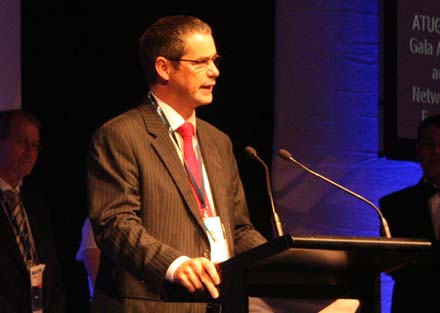Greedy ISPs kept from filtering trial

Communications Minister Stephen Conroy said that the reason some Internet Service Providers (ISPs) hadn't been chosen in the first round of ISP filtering was that they had greedily tried to get the department to pay for upgrades to their own equipment.

Stephen Conroy at the ATUG Awards on Thursday night
(Credit: Suzanne Tindal/ZDNet.com.au)
"Some of them, cheaply, took the opportunity to try and get the Commonwealth to fund an upgrade in their own equipment," he said, speaking at the Australian Telecommunications Users Group (ATUG) conference. "Some of them came to us and said look, we can do this no problem, zero dollar costs. So obviously we were able to start with them."
The million dollar costs which some parties had brought to the table were veiled attempts to try and get the government to upgrade their boxes, Conroy said
"There were a few try-ons in the process, but we had to work our way through it," he said.
That was the reason the first six ISPs were chosen, Conroy said. "It was actually a function of the applications which came in. No great conspiracy theory. We're still actively engaged in conversation with a number of applicants," he assured Blue Coat's country manager Wayne Neich who had brought up the subject.
Neich had said that his company had reached no understanding or insight as to why the six companies had been chosen, a concern after his company had invested a significant amount in the ISP filtering process.
Conroy also stuck the boot into those who were proclaiming the filter as the Australian equivalent to the Great Wall of China, saying that he only wanted to remove "refuse classification (RC) material" — material that includes child sexual abuse imagery; bestiality; sexual violence; detailed instructions in crime, violence or drug use and/or material that advocates the doing of a terrorist act.
Senator for South Australia Simon Birmingham, who was standing in for Shadow Communications Minister Nick Minchin, said that it gave Conroy credit that he sought to clarify the areas of content he aimed to restrict, but any support from the shadow cabinet would be based on if the ACMA list really was as narrow as the RC classification. If it were, it wasn't what Labor had been promising in its pre-election promises, he continued.
"If that is the outcome, it's a far, far cry from what Australian consumers were led to believe at the last election," Birmingham said, adding that from the campaign, families had been given the idea they could hand the mouse to the kids and they would be safe.
On the National Broadband Network, Conroy assured the audience that it would go ahead, despite difficult economic conditions, with one of the funniest comments of the day. "I can assure you it is anything but a dead parrot. It is more than breathing at the bottom of the cage. It is not nailed to the perch," he said.
In a doorstop after his speech, he also damned any hopes Telstra had of getting back into the process. "We would be rightfully open to compensation claims, legal challenges if we were to do that," he said.
The timing of Conroy's announcement of the winning bidder or bidders would depend on Prime Minister Kevin Rudd's timetable, Conroy said, since the Prime Minister wanted to be part of the announcement.
"He has an overseas trip coming up soon and so we are seeing whether we can get it ready in time before he goes or shortly after he comes back," Conroy said.